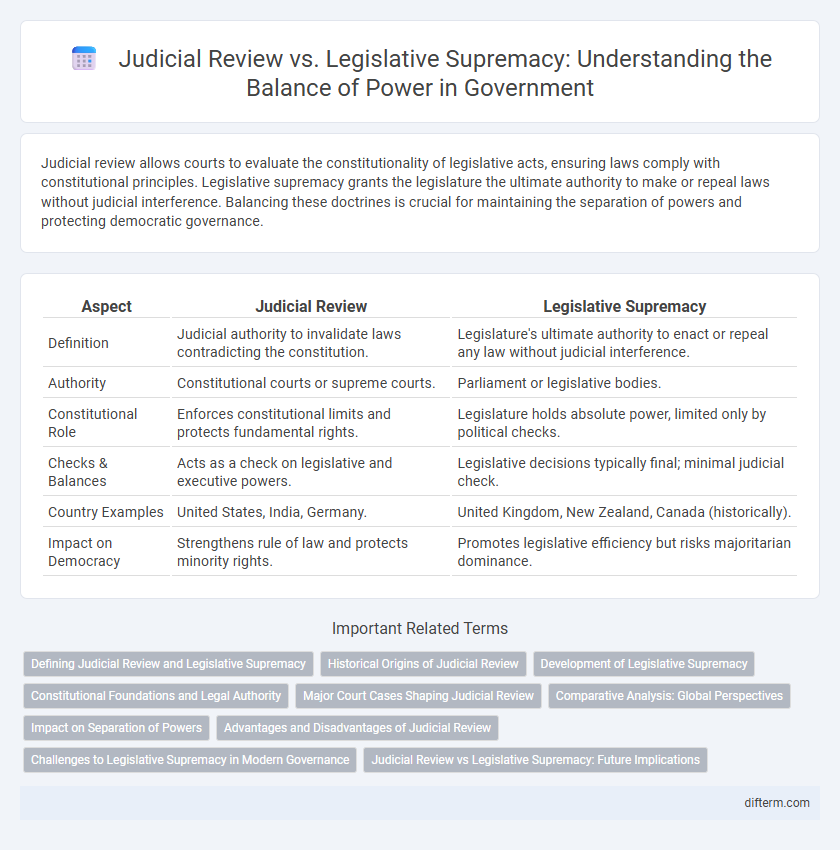Judicial review allows courts to evaluate the constitutionality of legislative acts, ensuring laws comply with constitutional principles. Legislative supremacy grants the legislature the ultimate authority to make or repeal laws without judicial interference. Balancing these doctrines is crucial for maintaining the separation of powers and protecting democratic governance.
Table of Comparison
| Aspect | Judicial Review | Legislative Supremacy |
|---|---|---|
| Definition | Judicial authority to invalidate laws contradicting the constitution. | Legislature's ultimate authority to enact or repeal any law without judicial interference. |
| Authority | Constitutional courts or supreme courts. | Parliament or legislative bodies. |
| Constitutional Role | Enforces constitutional limits and protects fundamental rights. | Legislature holds absolute power, limited only by political checks. |
| Checks & Balances | Acts as a check on legislative and executive powers. | Legislative decisions typically final; minimal judicial check. |
| Country Examples | United States, India, Germany. | United Kingdom, New Zealand, Canada (historically). |
| Impact on Democracy | Strengthens rule of law and protects minority rights. | Promotes legislative efficiency but risks majoritarian dominance. |
Defining Judicial Review and Legislative Supremacy
Judicial review is the process by which courts evaluate the constitutionality of legislative and executive actions, ensuring laws comply with the constitution. Legislative supremacy refers to the principle that the legislature holds the highest law-making authority, with its statutes prevailing over other government branches. Understanding the balance between judicial review and legislative supremacy is crucial for maintaining constitutional governance and the rule of law.
Historical Origins of Judicial Review
Judicial review originated from the landmark 1803 U.S. Supreme Court case Marbury v. Madison, establishing the judiciary's authority to invalidate laws conflicting with the Constitution. This principle emerged as a mechanism to maintain checks and balances between branches of government, ensuring legislative acts conform to constitutional parameters. Historically, judicial review contrasts with legislative supremacy, where legislative bodies hold ultimate law-making power without judicial interference.
Development of Legislative Supremacy
Legislative supremacy developed as a principle asserting that the legislature holds the highest authority to create, amend, or repeal laws within a state, unchallenged by the judiciary. This concept emerged prominently in parliamentary systems like the United Kingdom, where courts traditionally refrain from invalidating primary legislation passed by Parliament. The development of legislative supremacy underscores the priority of elected representatives in lawmaking, reinforcing democratic governance through legislative sovereignty.
Constitutional Foundations and Legal Authority
Judicial review is grounded in constitutional principles that empower courts to interpret the constitution and invalidate laws conflicting with it, ensuring the supremacy of constitutional law. Legislative supremacy asserts that the legislature is the ultimate lawmaking authority, with the power to enact or repeal any law without judicial interference, emphasizing parliamentary sovereignty. The constitutional foundations of judicial review derive from landmark cases like Marbury v. Madison, while legislative supremacy is rooted in constitutional frameworks such as the UK Parliament Acts.
Major Court Cases Shaping Judicial Review
Marbury v. Madison (1803) established the principle of judicial review, empowering the Supreme Court to invalidate laws conflicting with the Constitution. Subsequent cases such as Cooper v. Aaron (1958) reinforced the judiciary's authority to overrule state legislatures when constitutional violations occur. These landmark rulings underpin the balance of power by affirming the courts' role in checking legislative supremacy and safeguarding constitutional governance.
Comparative Analysis: Global Perspectives
Judicial review empowers courts to invalidate laws conflicting with constitutions, ensuring checks and balances seen prominently in the United States and India. Legislative supremacy, as practiced in the United Kingdom and New Zealand, vests absolute lawmaking authority in parliament with minimal judicial interference. Comparative analysis reveals judicial review enhances constitutional protection, while legislative supremacy prioritizes democratic lawmaking flexibility.
Impact on Separation of Powers
Judicial review empowers courts to invalidate laws conflicting with the constitution, reinforcing checks and balances within government structures. Legislative supremacy grants lawmakers ultimate authority over legal decisions, potentially diminishing judicial oversight. The impact on separation of powers hinges on whether judiciary or legislature holds predominant influence over constitutional interpretation and enforcement.
Advantages and Disadvantages of Judicial Review
Judicial review empowers courts to invalidate laws conflicting with constitutional principles, ensuring legal consistency and protection of individual rights. Its advantages include upholding the rule of law and preventing legislative overreach, while disadvantages involve potential judicial activism and undermining democratic decision-making. This balance highlights the tension between safeguarding constitutional integrity and respecting legislative authority in governance.
Challenges to Legislative Supremacy in Modern Governance
Judicial review challenges legislative supremacy by enabling courts to invalidate laws that violate constitutional principles, ensuring legal compliance with fundamental rights. Modern governance faces frequent tensions as judicial bodies scrutinize parliamentary decisions, balancing democracy with rule of law. This dynamic often leads to debates over the limits of legislative power and the protection of minority rights against majoritarian rule.
Judicial Review vs Legislative Supremacy: Future Implications
Judicial review's expanding role in checking legislative supremacy enhances constitutional accountability and protects individual rights against majoritarian overreach. Increasingly assertive courts may provoke legislative pushback, sparking debates on the balance of power between branches of government. Future implications include potential reforms to judicial appointment processes and legislative constraints designed to recalibrate this dynamic while preserving democratic principles.
Judicial Review vs Legislative Supremacy Infographic

 difterm.com
difterm.com